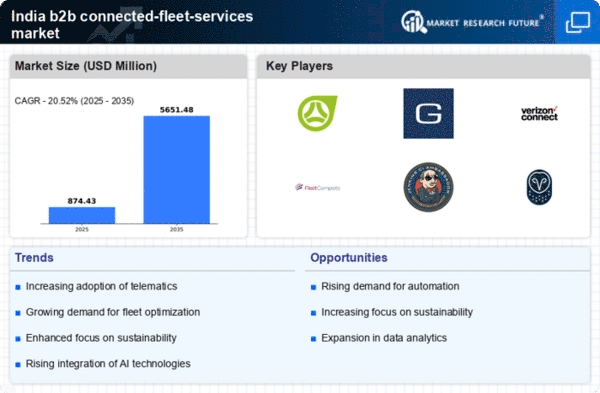Growing Focus on Cost Reduction
In the competitive landscape of the b2b connected-fleet-services market, businesses are increasingly prioritizing cost reduction strategies. Fleet operators are recognizing that connected services can lead to substantial savings through improved route planning, reduced maintenance costs, and enhanced fuel efficiency. By utilizing data analytics, companies can identify inefficiencies and implement corrective measures, which can result in savings of up to 25% in operational costs. This focus on cost efficiency is driving the adoption of connected fleet solutions, as organizations seek to maintain profitability while navigating market challenges. Consequently, the b2b connected-fleet-services market is witnessing a robust growth trajectory fueled by this imperative.
Government Initiatives and Regulations
Government initiatives aimed at improving transportation infrastructure and promoting smart mobility are significantly influencing the b2b connected-fleet-services market. The Indian government has introduced various policies to encourage the adoption of connected technologies in fleet management. For instance, the Faster Adoption and Manufacturing of Hybrid and Electric Vehicles (FAME) scheme aims to promote electric vehicles, which are often integrated with connected fleet services. Additionally, regulations mandating the use of telematics for commercial vehicles are expected to drive market growth. As a result, businesses are increasingly aligning their fleet strategies with government policies, fostering a conducive environment for the b2b connected-fleet-services market.
Rising Demand for Operational Efficiency
The b2b connected-fleet-services market in India is experiencing a notable surge in demand for operational efficiency. Businesses are increasingly seeking solutions that optimize fleet management, reduce operational costs, and enhance productivity. The integration of advanced telematics and data analytics allows companies to monitor vehicle performance in real-time, leading to informed decision-making. According to industry estimates, organizations that implement connected fleet solutions can achieve up to 20% reduction in fuel consumption and a 15% increase in overall fleet utilization. This drive towards efficiency is compelling many businesses to invest in connected fleet technologies, thereby propelling the growth of the b2b connected-fleet-services market.
Increased Emphasis on Customer Experience
The b2b connected-fleet-services market is also witnessing a shift towards enhancing customer experience. Businesses are increasingly aware that efficient fleet management directly impacts service delivery and customer satisfaction. By leveraging connected technologies, companies can provide real-time updates to clients regarding shipment status, thereby improving transparency and trust. Furthermore, the ability to respond swiftly to customer inquiries and issues can lead to higher retention rates. As organizations strive to differentiate themselves in a competitive market, the emphasis on customer experience is likely to drive the adoption of connected fleet services, contributing to the overall growth of the b2b connected-fleet-services market.
Technological Advancements in Connectivity
Technological advancements in connectivity are playing a pivotal role in shaping the b2b connected-fleet-services market. The proliferation of 5G technology is expected to enhance real-time data transmission, enabling more efficient fleet management solutions. With improved connectivity, businesses can leverage IoT devices to monitor vehicle health, track assets, and optimize routes. This technological evolution is likely to lead to a more integrated approach to fleet management, where data-driven insights can significantly improve operational performance. As companies increasingly adopt these technologies, the b2b connected-fleet-services market is poised for substantial growth, with projections indicating a potential market size increase of over 30% by 2027.
















